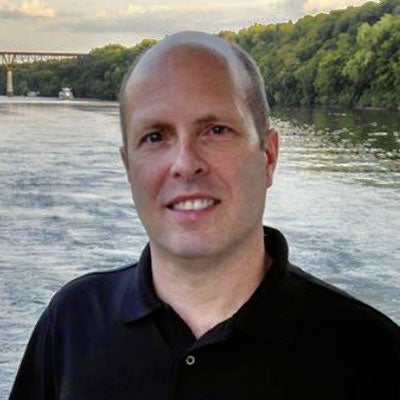
Brian Ruis, MS, is the GESR Technical Core Director.
State-of-the-art CRISPR-based genome engineering – and decades of combined gene editing expertise – are now available at half cost to UVA Comprehensive Cancer Center member researchers through its new Genome Engineering Shared Resource (GESR).
The GESR is led by Faculty Core Director Eric Hendrickson, PhD, a professor in the Division of Hematology and Oncology and affiliate member of the Department of Biochemistry and Molecular Genetics, and Technical Core Director Brian Ruis, MS. Lab Specialist Elizabeth Dudley rounds out the team.
GESR is a full-service core capable of designing CRISPR editing strategies as well as generating genetically engineered mammalian cell lines tailored to each principal investigator’s (PI) individual specifications, Ruis says.
“GESR’s services are essential to Cancer Center member researchers’ work, because genetic alteration of mammalian cell lines allows PIs the ability to design mechanistic and therapeutic experiments related to the characterization and investigation of their particular cancer model,” Ruis says.
The GESR comes to UVA with Dr. Hendrickson and Ruis from the University of Minnesota-Twin Cities, where in 2015, they helped establish its original incarnation in support of research at UMN’s Masonic Cancer Center. There, as now at UVA, the Hendrickson laboratory focused on DNA double-strand break repair working in collaboration with that of DNA replication specialist Anja K. Belinsky, PhD, also now at UVA as Professor and Chair of Biochemistry and Molecular Genetics.
Prior to CRISPR, generating genetic modifications of genes relied on gene editing techniques that could take up to three months or longer to complete. With the advent of CRISPR/Cas9 DNA editing technology in 2013, the promise of easier, efficient, and cost-effective production of genetically modified cell lines became possible. Although initially skeptical about the new technology, Ruis began using the new reagents in 2014 and hasn’t looked back.
As the UMN Masonic Cancer Center’s 2015 NCI Core Grant renewal approached, Dr. Bielinsky, who served as co-leader of the Genetic Mechanism Program at that time had an idea, Ruis says: a new shared resource providing genome engineering services. That year, the original GESR was established with Hendrickson and Branden Moriarity, PhD, as co-directors and Ruis as coordinator.
As of Fall 2022, the UMN GESR, under the coordination of Ruis, completed over 90 cell line projects and 40 mutant mouse projects for 65 independent UMN researchers. This resulted in the GESR being acknowledged in over 10 peer-reviewed publications and was singled out during UMN’s Cancer Center NCI grant renewal.
It is Ruis’ goal for the GESR and its personalized genome engineering services to be an asset to UVA’s Comprehensive Cancer Center by permitting PIs to move forward with their individual research projects as efficiently as possible.
GESR services include:
Non-Phase-based projects:
- Single guide RNA (sgRNA) design
- sgRNA genome editing validation
- HDR donor vector design
- HDR donor vector construction
Phase-based projects:
- Non-essential gene KO cell line
- Non-essential gene KO enriched population
- Multi-allelic non-essential gene KO cell line
- Construction of conditionally null alleles for essential genes
- Epitope tagging
- Incorporation of single amino acid knock-in mutations
- Incorporation of single nucleotide polymorphisms (SNPs)
- CRISPR-based whole genome KO screen
The GESR also provides letters of support for grant applications upon request.
Instrumentation available through GESR includes:
- CellRaft AIR System
- Neon NXT electroporator
- Countess3 cell counter
- EVOS M5000 imaging system
- Laxco Eco inverted microscope
- 1300 series A2 Biosafety cabinets
- HERAcell VIOS 160i CO2 incubators
- Eppendorf Mastercycler ProS thermocycler
To help launch GESR, Cancer Center members will receive a 50 percent co-pay on their charges.
UVACCC’s shared research resources offer state of the art instrumentation, technology and scientific expertise for the advantage of research members. One of the benefits of full membership in the UVA Cancer Center is receiving a partial subsidy, referred to as the CCSG Co-pay, when purchasing services and/or scheduling instrument usage with designated Cancer Center cores.
GESR is located in the Cell and Molecular Biology laboratory in Pinn Hall Room 6218. If you have questions or are interested in GESR services, please contact Brian Ruis at szz4sh@virginia.edu or 434-297-9458.
Filed Under: Research
